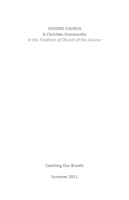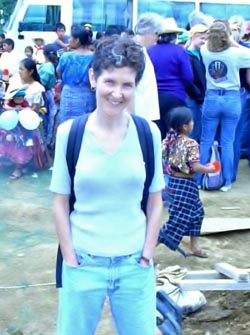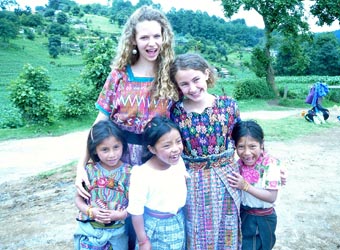Three Words from Guatemala by the Smith-Estrada Family
 4 September 2011
4 September 2011
The 12th Sunday After Pentecost
Leslie Smith, Steven Estrada, and Annie Smith-Estrada were members of Seekers Guatemala Pilgrimage earlier this summer. Today, each of them offered some reflections on that journey.
 Leslie:
Leslie:
The pilgrimage started in the Miami airport as Steve and I waited for our next flights. Steve had been reading a passage in Abraham Verghese’ Cutting for Stone. In the scene from the book, Matron, the nun in charge of the struggling Ethiopian hospital, confronts a benefactor about sending boxes of Bibles instead of much-needed financial support. In the airport lounge, we were surrounded by church mission groups from places like Iowa and Pennsylvania and Oregon wearing bright matching t-shirts exclaiming “God’s Children Everywhere! Mission trip to Guatemala 2011!” or “Sharing the Love! Iowa to Guatemala!” We were keeping our distance. Sparked by our uneasy identification, Steve opened: “What if all of the money that everyone here is spending on airfare and accommodations was given directly to the people of Guatemala who are most in need?” Steve began calculating the hundreds of thousands of dollars that would be available. “Isn’t that what the people of Guatemala would most appreciate? Rather than a horde of do-gooder Americans descending?”
I spoke to the power of not simply writing checks from afar, but going and working alongside.
“But that’s about OUR needs. That’s about US,” Steve responded. “What about the Guatemalans? What would they want and need?”
We spoke of our family experiences, Steve and the girls re-building houses with the St Bernard Project in New Orleans, Carmen’s experience in El Salvador, our previous trip to Guatemala. There was no question that these had all been undeniably transformative experiences for US, but how to think about the experience of the other?
I remembered out loud Steve’s story about his first post-Katrina trip to New Orleans and how everyone had a story to tell. In a men’s room encounter, an older man told Steve of his experience with the storm in vivid detail and ended the conversation by saying, “Don’t forget us.” Steve’s presence was important as he was listening and bearing witness. We went back to thinking together about our experience in the village of La Loma and how our being there, unskilled as we were (I should speak for myself here), helped to launch the building of the school.
Steve pressed, “Our going still seems more about our needs.”
Yes, I recognized the benefits. Our collective trips to New Orleans, El Salvador and Guatemala had created a whole new awareness in ourselves and in our daughters, a sense of being citizens of the world, a whole different sense of engagement, investment and caring. We had been enriched.
Yet what of the experience of the other in the process? Steve kept returning to this question in different ways. He recognized how much his own experience growing up poor and needing to rely on others’ help and charity affected his perspective. As Steve said, “When we were given hand-outs, it only made me feel more helpless, without power or choices…lacking in comparison”. This had not occurred to me. How can one not feel acutely aware of what is lacking in the face of encounters with privileged others?
I was left thinking about the hierarchy or superiority implicit in helping others.
I share this conversation with you this morning for a reason. Steve and I probably would not have had this rich discussion had we not been enroute to Guatemala. The pilgrimage had begun. We were already being challenged and transported out of our comfort zone.
“Open hands, open hearts”, Marjory would say to us in Guatemala. These simple words speak to an attitude that is less about giving and helping than about engaging and receiving.
 Annie:
Annie:
There was a day in Guatemala that we worked in the ditches. It had rained the night before and our job was to get the water out. So by lunch time we were very muddy. I left for lunch a little early because I wanted to make tortillas with the cooks. When I got there, we knew there was no way I would be making tortillas all muddy like I was. So a few of the women ended up taking me and undressing me and redressing me in the beautiful Mayan clothes that they wear. When I got back to help the cooks I guess the look that I saw on their faces was pride. And I was proud too.
I helped them, but I must admit my tortillas were pretty lopsided. With my broken Spanish and the help of the bus driver’s broken English, I talked to the cooks. They asked me how old I was and I said “16”. They said very young, but old enough to marry. I was pretty taken aback by this and how different the mind set was here. She said that her son was 17, jokingly playing matchmaker. I asked her if my tortillas would be good enough for him.
She said we’d work on it.
It was very important for me to help the cooks, to do what the women do there, every day, and to show my respect for what they do, even if it was as small as making tortillas with them and asking about their families. In El Salvador, I lived with my “family”. There was a mutual respect and gratitude, that was somewhat lacking in my experience in Guatemala. In Guatemala, we went and worked with them, but we did not live with them. We went back to our privileged hotel back in Antigua. It made it harder to connect with the people in the village. And it really got me thinking about how I could connect with the people of the village in Guatemala like I did with my “family” in El Salvador. Cooking with the women was a really important way for me and hopefully for the cooks to get to know them and to show them my respect.
Steve:
To begin my part of the sermon I’ll share with you some writing Leslie offered to me that seems particularly relevant to the conversation we’ve been having.
Henri Nouwen wrote: “One of the most rewarding aspects of living in a strange land is the experience of being loved not for what we can do, but for who we are. When we become aware that our stuttering, failing, vulnerable selves are loved even when we hardly progress, we can let go of our compulsion to prove ourselves and be free to live with others in a fellowship of the weak. That is true healing.”
Loved not for what we can do, but for who we are? Even when we hardly progress? We can let go of our compulsion to prove ourselves? That must take a real leap of faith.
Leslie and Annie have talked a bit of what we struggled with on our second Guatemala service trip. It was not the mud, the aching backs, the long bus rides or the hard work. As my previous handle, Senior Cemento, would suggest, these are well within my comfort zone. And I am proud to be part of a family, and a congregation that encourages work and views it as a privilege and even as a spiritual endeavor. Indeed, as Leslie described our conversation in the airport, and as Annie alludes to in her own story, the biggest challenge was piling on that airplane with all the brightly tailored, well fed Americanos heading south to help save the Guatemalans. From what, I wondered. Am I one of those?
The “strange land” of our trip was not Guatemala. The hard work was not digging the trenches or pouring the cement to build a school. It was coming to terms with being a pilgrim- am I one of those? I would struggle to find my place in that strange land. I think we all did. The rewards came in unexpected places.
In Guatemala, the earth and sky are alive. Volcanos puff constantly, reminding us that the hot mantle is moving below our feet. There, the rain pours down with such insistence that it seems to be trying to wash the mountains away before they reach the clouds.
God took several forms on this trip, to rescue me from myself and to remind me that that we are loved despite our best efforts to entangle and complicate things. God showed up as one of those mountain killing, all night rainstorms that Annie described, turning the earth to black gum. God showed up as a silver haired Anglo woman who said a few simple but profoundly wise words about pilgrimage. And God showed up as our jeffe- our foreman. And he was not a kind God.
Let me explain. A group of us had gravitated toward, well, the low end jobs while others performed skilled labor. There were the rebar tiers, the fabricators, and just a few, you know, supervisors to keep everything on track. They walked on the surface. Their work required dexterity and mental agility. Then there were the trenchies The story has been well told. In life, some of us have stuttered, failed. We have hardly progressed, in Nouwen’s words, to such a degree that we –the trenchies- must prove ourselves worthy each and every day, again and again. On that soggy morning we jostled each other to the edge of the trench to be the first to dive knee deep-first into the brown slop ahead of all the others. Soon, with buckets and shovels flying, we were all head to toe encrusted in mud. God, and the Guatemalans, must truly have loved us- best.
By late morning Annie and her crew had succeeded in clearing two very deep footings. They had formed a fire line and bucket by bucket drained the two meter holes so they could dry out, ready for the foundation pour the next day. When Annie left late morning to help the village women make tortillas, and to be transformed by the gift of their exquisite Guatemala costume, I felt that we had indeed been smiled upon. We had truly earned His Blessing.
My task that morning was to clear a roughly 30 foot section of ditch that had become inundated and full of mud. I had cleared it the day before but with the night’s deluge a portion of the overhead pile had fallen back into the hole. The mud was wet, heavy and infuriatingly sticky. Once you got it on your shovel it fought you – like peanut butter on a spoon- to stay there.
Nevertheless, by close to lunchtime I had re-cleared my ditch and felt a great sense of accomplishment. Whatever time-off-in-purgatory-for-good-behavior I had earned I was sure it would be noticed in the Great Accounting.
And then the jeffe arrived.
Through a combination of hand gestures, short orders in the lovely singsong of Kaqchikel, and finally, unmistakably, with the movement of his hoe, the ubiquitous tool of every Mayan laborer, jefe was directing me to clear the overhead pile of dirt. It had become alarmingly high and needed to be moved across the trench to the worksite edge. Fine, I thought, and as the wheels of ingenuity slowly sputtered to life in my brain- how to move a big pile of mud from over there to over there- he began shoveling the black, Precambrian goo. Back into my trench.
Leave no doubt. He intended to move the dirt from one side to the other by piling it back into the ditch so that I, the doer, could shovel it all out again.
I also knew by his stubborn gleam- a look that any man or woman who’s worked with their hands and their backs would recognize- standing over me, toe to eyebrow, he intended that I should shovel it in so that I could shovel it out again.
No by God- I wouldn’t do it. It was too much. It was unfair. I was here to build a school, to do good work, to commune with the people of Pueblo Viejo, to serve my church, to represent my country. Perhaps, I thought, if I’d worn one of those brightly colored On a Mission for Christ t-shirts, jefe would not have mistaken me for a Mayan laborer! I would have to talk with our organizers about piling a few in the tool chest next time for emergencies such as this.
But Marjory, our co-minister and organizer had said, this is not a mission, it is a pilgrimage. If you do nothing all week save to be with us it is all right.
We are here to help, but we are not here to change anyone. Just ourselves.
The noontime meals made by our Guatemalan hosts were wonderful stews of small sweet potatoes, enormous mutant carrots that grow in the rich volcanic soil of Tacpan Chimaltenango, beans and rice, and of course Annie’s fat tortillas. After I had eaten and recounted the story with my fellows, all of whom were sympathetic and deeply understanding, I returned to the worksite. find my ditch filled up again. In a strange land where people are more plentiful than backhoes, the jefe and his men knew how to move a pile of dirt. You push it into the hole you just dug and then shovel it back out the other side.
So, that is how I spent my afternoon.
I do not know if God, or the jefe, smiled more or less on me that day. I don’t know if I cut my days in purgatory or proved myself worthy or unworthy. I did recapture my rhythm; shovel down, shovel up, shake, shake, shake, shovel down shovel up. . . you get the picture, and by day’s end the ditch was clear again, the angled bench at the bottom crisp, and the mud and pebbles swept away. But I don’t think that was the point of this trip. Another man, or young boy, Luis my young friend perhaps, would finish the work I had started on another day and the school would be built with or without me.
For a few hours I did what countless men and women do their whole lives. Shovel down, shovel up; scrub away, scrub toward; drive away from home, drive back again. calculate the trajectory of a missile, or the heartbeat of a newborn infant. It is all work. It is what we do in this strange land.
Are we loved for who we are, not what we do? Now that does take a leap of faith.